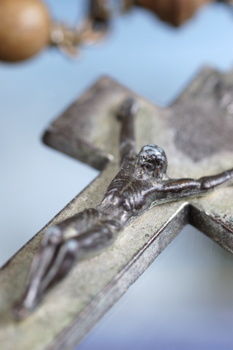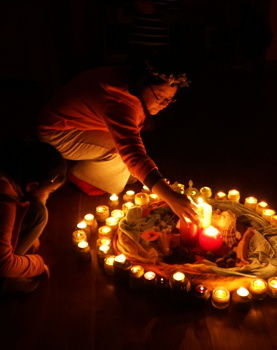OCD
Religious & Traditional Healers for OCD: Helpful or Hurtful?
Therapists may learn their clients are also working with a traditional healer.
Posted January 29, 2017
Obsessive-compulsive disorder (OCD) is a leading cause of mental health disability worldwide, with over 112 million individuals suffering from the disorder at some point in their lives. It afflicts people from every nationality, culture, and faith. People with OCD may spend many hours per day tormented with unwanted thoughts and repetitive compulsions. As a result, they experience serious problems at work, at home, and in relationships.
Worries caused by OCD may fall into a number of symptom-based categories, with fears centering on contamination, symmetry/disorder, doubts about causing accidental harm, and committing unacceptable/taboo acts. Unacceptable/taboo fears usually swirl around morality, and may include unwanted sexual obsessions, religious fears, and worries about causing harm to others intentionally. The psychological treatment of choice for OCD is cognitive-behavioral therapy, such as exposure and ritual prevention or cognitive therapy, which are rigorously tested approaches well grounded in theory and science.

OCD can cause people to have unrelenting moral concerns or even appear demon-possessed. So it's no surprise that many turn to clergy or traditional healers for help, and usually this includes a spiritual or religious frame of reference. Therapists may not realize that their clients may be utilizing more than one avenue to achieve wellness, and in such cases there is always the potential for a conflict of approaches and values. Therapists may wonder what to do, if anything, in these situations.
First, it is important to understand that religion does not cause OCD, even if the OCD has religious themes, so therapists should be careful not to blame a client’s religion for symptoms. If the therapist mistakenly thinks that religion is causing OCD, this may result in efforts control or suppress the client’s beliefs to facilitate treatment. This is sure to undermine trust and empathy, leading to conflict and drop out. Therefore, the best approach is to work respectfully within the confines of the client’s religious laws and traditions, to ultimately facilitate treatment compliance. In fact, it’s much more effective to recruit the client’s religious values in service of treatment than to try to suppress them. In most cases, the OCD has gotten in the way of carrying out proper religious duties (i.e., prayer, attendance at services, fellowship, important ceremonies) rather than improving religious life.
Other than mainstream religions, there are many other traditional practices used connected to spiritual, medicinal, and even psychic ways. Ethnic minority groups have introduced their approaches to health and well-being into the Western culture through immigration and globalization, and so clients may be adherents of ‘traditional medicine’. The World Health Organization defines this as knowledge, skills, and practices based on the theories, beliefs, and experiences indigenous to different cultures, whether explicable or not, used in the maintenance of health as well as in the prevention, diagnosis, improvement or treatment of physical and mental illness. Such practices include complementary and alternative medicine (CAM), such as Ayurveda, yoga, herbal medicine, acupuncture, chi gong, Voodoo, astrology, Santeria, and new age therapies.
Therapists should be prepared to discuss the role of the traditional healer with their clients. Even if the therapist feels completely certain the traditional approach is not helpful, it is important to show respect for these systems. Indigenous, cultural and traditional healing practices are time-honored methods that many have historically used to alleviate both physical and psychological problems – sometimes for thousands of years. Although examples of traditional treatment that have caused harm are frequently cited, many find these approaches central to their well-being.

In the face of moral worries, a religious healer may seem like the most appropriate person to provide help, so it is not uncommon for those with OCD to enlist priests, rabbis, and other healers for reassurance when facing obsessive doubt. However, sometimes well-meaning traditional healers provide help that is not actually helpful for OCD, and may even make symptoms worse. Given a conflict between a therapist and a traditional healer, the client will usually side with their traditional healer and abandon the therapist. Thus, it is better to collaborate with the healer rather than force the client to make a choice. With the permission of the client, the therapist can reach out to the traditional healer to describe the client’s problem and the model for the CBT treatment approach. If the traditional healer is supportive, then that will go a long way toward helping the client feel motivated to fully participate in therapy. It can also be helpful for the traditional healer to know what practices are counterproductive for the client’s progress, such as reassurance.
Remember that many types of specialists may be involved in some facet of a client’s OCD. These may include family physicians, psychiatrists, psychotherapists, social workers, and even clergy and other traditional healers. It is important to be aware of all the resources clients bring to bear for help in these situations to ensure harmonious and effective treatment while respecting their values and culture.
Have you visited a traditional healer for help with OCD? Did you find it helpful or harmful? Let’s have a discussion! Please share your experiences or observations below.
References
Ayuso-Mateos, J. L. (2006). Global burden of obsessive-compulsive disorder in the year 2000. Global Program on Evidence for Health Policy (GPE) Global Burden of Disease 2000. World Health Organization. Draft 21-08-06.
Himle, J. A., Taylor, R. J., & Chatters, L. M. (2012). Religious involvement and obsessive compulsive disorder among African Americans and Black Caribbeans. Journal of Anxiety Disorders, 26(4), 502-510. doi:10.1016/j.janxdis.2012.02.003
Huppert, J. D., Siev, J., & Kushner, E. S. (2007). When religion and obsessive-compulsive disorder collide: Treating scrupulosity in Ultra-Orthodox Jews. Journal of Clinical Psychology, 63(10), 925-941. doi: 10.1002/jclp.20404
Moodley, R., & Sutherland, P. (2010). Psychic retreats in other places: Clients who seek healing with traditional healers and psychotherapists. Counselling Psychology Quarterly, 23(3), 267-282. doi:10.1080/09515070.2010.505748
Pouchly, C. A. (2012). A narrative review: arguments for a collaborative approach in mental health between traditional healers and clinicians regarding spiritual beliefs. Mental Health, Religion & Culture, 15(1), 65–85.
Williams, M. T., & Steever, A. (2015). Cultural manifestations of obsessive-compulsive disorder. In C. W. Lack (Ed.), Obsessive-Compulsive Disorder: Etiology, Phenomenology, and Treatment (pp. 63-84). United Kingdom: Onus Books. ISBN: 978-0-9926000-5-1.


